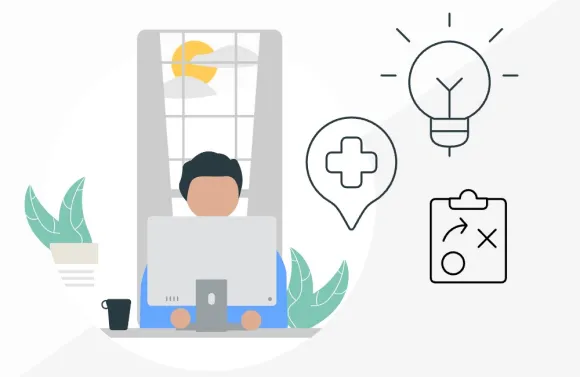
You’re a benefits leader gearing up for a new year, and that means new opportunities to connect your employees to their benefits in meaningful ways. The truth is, it takes many touchpoints to keep benefits front-and-center. We’re here to help, sharing our most inspiring resources to help you better engage and communicate with employees throughout the year.
1. For Leveling Up Your Benefits Communication Strategy
Any marketer will tell you that the best communications start with a strategy. It means your messages are thoughtfully planned and well-executed, engineered to perform. These resources, inspired by tried-and-true marketing strategy, can help you get your employees more engaged and more likely to participate.
- The Top 5 Objectives Driving the Modern Employee Benefits Strategy
Successful benefits programs are carefully designed and deployed to reinforce and deliver on today’s most pressing people-oriented organizational objectives – concisely outlined in this blog post. - Plan Ahead Employee Benefits Enrollment & Engagement Playbook
Ready to make sure your next benefits year is a smash hit? Use this playbook to identify goals for the year ahead, make your objectives S.M.A.R.T., create a benefits strategy plan and connect that to the employee experience. - Action! Solving The Benefits Communication Conundrum
This blog covers the AIDA (Attention, Interest, Desire, Action) hierarchy of effects marketing model. While marketers dependably use it in their campaigns, it’s also an effective formula for turning employees into benefits power-users who take full advantage of the plans and programs available to them. - The Top 5 Ways to Engage Company Leaders in Employee Benefits Success
If strategy starts in your C-Suite, this blog post will give you fresh ideas to enlist company leaders in your success.
2. For Communicating Benefits Year-Round
Benefits leaders like you are often inundated every day with responsibilities that pull you in every direction. That’s why it can be difficult to stay on track with benefits communications throughout the entire year, even with the best of intentions. But when you have a game plan already set, it makes it easier to find success, which is exactly what these resources are designed to do.
- Creating a Benefits Communication Calendar for Year-Round Engagement
Get a look into the process of creating a benefits engagement calendar along with some helpful tips as you embark on the path of designing your own. - Monthly Benefits Campaign Helpers
Keep your HR team and workforce in-the-know about benefits-adjacent calendar observance days, holidays and other opportunities to engage in employee benefits programs. - The Top 5 Ways to Get Employees Excited About Using Their Benefits
Indeed, among the best practices for keeping employees engaged in their benefits is communicating on a regular basis. This blog post shares more ideas. - From SHRM: 5 Tips for Closing Benefits Communication Gaps
This article from SHRM covers why many messages around employee benefits fall flat and what HR should be doing differently to encourage more engagement throughout the year.
3. For Building a Powerful Benefits Culture and Brand
A powerful benefits culture and brand can do wonders for not only attracting your employees’ attention, but also driving interest and action through the benefits year. Not to mention, it can do a lot to attract talent. Take time to invest in a benefits brand your workforce will love – and start by checking out these resources.
- 5 Steps to Building a Powerful Benefits Brand for Open Enrollment
This infographic outlines the five steps for branding success that will help attract and engage employees during open enrollment and beyond. - The Top 5 Keys to Building a Benefits-Driven Culture
A culture of wellness is truly a win-win: when your workers are happy and healthy, they tend to perform better, take fewer sick days and experience less burnout. In this blog, get the best practices to help ensure your benefits and culture are in sync. - Bringing Your Benefits Fair Strategy to Life
This playbook contains some great theme ideas for your annual benefits fair – themes that can extend to year-round communications that support a winning employee benefits brand. - From McKinsey: How is the CHRO Role Changing?
This article from McKinsey discusses how today’s HR leaders can keep the “human” in human resources. - From Forbes: 15 Ways HR Leaders Can Help Build A Sustainable Company Culture
Fifteen members of the Forbes Human Resources Council share their top strategies for HR professionals looking to build a sustainable company culture.
4. For Making the Most of OE Communications
Communicating with employees about their benefits is a year-round effort. Though, in the days leading up to open enrollment, communication takes on a different level of speed and significance. Make your OE communications memorable, drive action and cut through the clutter with these resources.
- The Top 5 Ways to Make Your OE Communications More Clickable
Benefits communications compete for attention in employees’ inboxes, which means benefits managers need to make them pop. This blog post covers the steps to inspire clickable OE communications that get your employees actively engaged. - The Top 5 Ways to Make Your Open Enrollment Communications Memorable
One of the last things you want is for important and time-sensitive benefits information to be ignored or overlooked – and to be fair, employees don't want to miss critical messages, either. This blog shares quick tips to fine-tune your messages and help keep them top-of-mind. - Open Enrollment Success: Communication Tactics & Timelines
Use this guide to determine the best communication tactics for your audience(s) and see examples of an open enrollment communications campaign plan. - 5 Innovative Approaches to Open Enrollment Communications
Here are five innovative approaches to punch up open enrollment communications that drive employee engagement. - Warm Up for OE Employee Benefits Enrollment & Engagement Playbook
Among other can’t-miss insights, this handy playbook contains tips for making impactful changes to your benefits education and communication materials as well as a sample open enrollment season timeline.
5. For Boosting Employees’ Personal Health Literacy
Personal health literacy is not something that is learned overnight. It takes guidance, learning and practice. And since employers play an integral role in providing for their people’s health care and related benefits, the workplace is a natural setting to build – and apply – health literacy skills. This resource dives into the ways you can help employees understand their benefits.
- How to Boost Employees’ Personal Health Literacy
This blog covers the five ways you can help your employees boost their health literacy and become more informed health care consumers. - Twelve Terms Every Health Plan Member Should Know
Help employees better understand what their benefit options mean with this easy reference for common health care terms. - Employees Won't Engage with Preventive Care? Here are 6 Ways to Change That
This post looks at the importance of preventive care from an employer’s perspective and explains how you can improve employee education and engagement in your programs. - Employee Benefits Engagement Campaign: Insurance Awareness
Use these campaign recommendations to help spread the word about the importance of insurance coverage. - From CDC: CDC’s Health Literacy Website
This site is for health communicators, public health professionals, and community leaders who seek information and tools on health literacy research, practice, and evaluation.
So, there you have it! With these resources at your side, we hope every benefits professional feels more inspired and at ease with building your own benefits communications plan.


